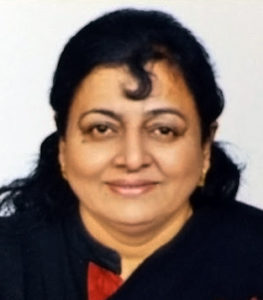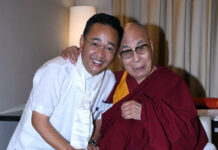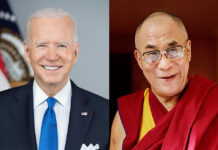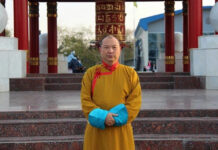(TibetanReview.net, May06’20)
As I sat brooding over the depressing news pouring out from all around the world and the uncertainty generated by Covid-19, my spirits sank. Amidst political leaders throwing accusations, and religious heads struggling to cope with the new scenario where the places of worship needed to be closed, an email in my inbox caught my attention. “Prayer is not enough” the title said. As intrigued as I was by this, to my utter delight I found out who else but the revered Dalai Lama could say this!
Ever since I met and interviewed him in 2017, I have been in awe of this child-like man, who possesses the ability to laugh even at a series of misfortunes. That however, only adds to the profound effect his words leave; words that ring of deep wisdom and a pure heart filled only with love and compassion for the entire humanity.
In this time of social distancing and feeling cut off from the world, his message of ‘one humanity” suddenly made me feel connected. “Whether we like it or not, we are born as one human family. We have same fears, hope, uncertainty and desire for happiness”, he said. Rooted in the Buddhist awareness of existence of suffering through old age, sickness and death, his empathy with the prevailing concerns struck a cord. Reminding of the circle of “creation, abiding and destruction” in ancient Indian tradition, he expressed faith in all living beings’ remarkable ability to survive and rebuild. The words acted as a soothing touch. While applauding the selfless efforts of the medical staff and measures taken by governments, he exhorted people to accept the “Universal Responsibility” which in present situation consists of maintaining social distance and keeping faith in the efforts. What made me admire His Holiness was his uniqueness as a religious leader who openly says that prayer alone is not sufficient. That he as a spiritual leader holds no “magical powers” and thus people should take all precautions, in addition to relying on empirical science to fight the pandemic and prevent future occurrences. Stressing on the need for availability of clean water to all, he reiterated that hygiene is one of the bases of effective health care.
Ordinary mortals complain of the hardships while the wise learn from them. His Holiness’ reminder of human beings’ interdependence not only on each other but also on mother earth resonated well in these times. However what calmed me down was his advice of “emotional disarmament”. “Think rationally without fear or rage”, he said. Cleanse yourself of anger, panic and greed. And lastly the reiteration of Buddhist principle of Impermanence. This virus will pass the way wars have passed. Human beings will have an opportunity to rebuild. In his characteristic non-assuming manner, he then showed the way forward, “If a problem has a solution, we must work to find it; if it does not, we need not waste time thinking about it”. Urging for a coordinated global effort to fight the pandemic, he wished us a happier and healthier world. By the time I finished reading the mail, I certainly was happier, and a lot emotionally healthier.
*Prof. Madhu Rajput is a faculty of Department of Western History, University of Lucknow, UP, India. She has written 08 books including a book on Tibetan Women, titled, “Occupational Mobility in Exile: A Socio-Economic Study of Tibetan Women in Dharamshala and Dehradun” (2019).







